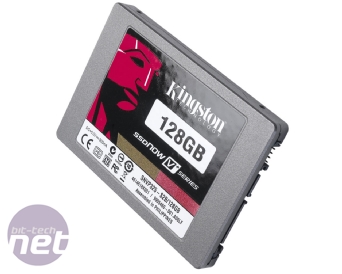Results Analysis
With Toshiba having had 18 months on the SSD sidelines watching the competition learn and optimise their controllers, we were hoping for a solid showing. For the most part, we weren’t disappointed.Sequential speeds as recorded in AS SSD averaged at 222MB/sec read and 177MB/sec write, and showed no deterioration following our 1TB write load and subsequent TRIM command. The sequential write performance was very good in particular, outpacing the Indilinx-powered OCZ Vertex by a commendable 30MB/sec.
Access times weren’t as unaffected by our 1TB write, rising from 0.139ms to 0.212ms for read and from 0.392ms to 0.439ms for write. However, these times are still pleasingly low, and comparable to competing SSDs.
Sequential performance measured in ATTO Disk Benchmark was also good, and while the new Toshiba controller shares the Indilinx drive controller’s poor 4KB sequential read performance, 64KB and 1,024KB performance was much better, with the 64KB sequential reads comfortably outpacing the Samsung controller in the Corsair P128.
One cause for concern with the Kingston is the sequential write performance with 64KB and 1,024KB files – we saw some minor, but noticeable, performance degradation following our writing of 1TB to the drive, despite the successful execution of the TRIM command. This is an issue we’ve also observed with the Samsung drive controller. While this issue won’t reduce performance by a horrendous amount, it still isn’t the perfect TRIM-based performance recovery displayed by the Intel and Indilinx drives.
What’s perhaps most surprising though is the comparatively poor random read and random write performance. We saw a random read speed of 18.8MB/sec, which is just half that of the OCZ Vertex and similar Indilinx-controlled drives. While a random write speed of 6.79MB/sec when clean and of 4.59MB/sec post-TRIM is a little better than the Samsung controller used in the original SSDNow V+, maximum write latencies, are worryingly high from the outset at 590ms, and peaked at 768ms post-TRIM. This is close to a whole second of random write lag, and approaches the sort of maximum write latencies we thought had been eliminated since the first generation of JMicron drive controllers.
Finally, looking to our remaining real world test of booting Windows 7, the drive performed identically in clean and TRIMed state, with a boot time of 34 seconds. This is roughly the same as all the competing high end drives, with the extra second of waiting likely due to the comparatively inferior read speeds of the Kingston.
Conclusion
There’s a lot to like about Kingston’s relaunch of the SSDNow V+ series, not least superb sequential write and read speeds – the typical headline for SSDs and the benefits they offer.The inclusion of TRIM right out of the box is great too – we’ve had to wait close to a year for competing drives to start supporting the Windows 7 command, so it’s great to see a drive ship with it enabled. As we’ve seen, TRIM makes a massive difference in thwarting the performance degradation issues that have long troubled SSDs.
It’s not all perfect though, and we were surprised to find that the SSDNow V+ 128GB (and its Toshiba T6UG1XBG controller) was let down by its random read and random write performance. These speeds are just as important as the headline-grabbing sequential read/write speeds, as otherwise the drive will be slow when performing seemingly innocuous tasks such as loading multiple applications or writing to log files. The high maximum latencies of the Kingston were a cause for concern too, even if the average latencies were low.
While the bundle, with its cables, caddy and drive cloning software is handy, it also means that this drive is competing with the OCZ Vertex on price at around £270-£280. Overall, the Vertex delivers fewer compromises in performance and is backed by a support team that’s at least equal to the high reputation of Kingston’s team. While the Kingston SSDNow V+ is a capable drive then, but it’s still second best to the Indilinx-powered OCZ Vertex, which along with the Crucial M225, remains our SSD of choice.
- Features
- x
- x
- x
- x
- x
- x
- x
- x
- -
- -
- 8/10
- Performance
- x
- x
- x
- x
- x
- x
- x
- x
- -
- -
- 8/10
- Value
- x
- x
- x
- x
- x
- x
- -
- -
- -
- -
- 6/10
- Overall
- x
- x
- x
- x
- x
- x
- x
- -
- -
- -
- 7/10

MSI MPG Velox 100R Chassis Review
October 14 2021 | 15:04












Want to comment? Please log in.